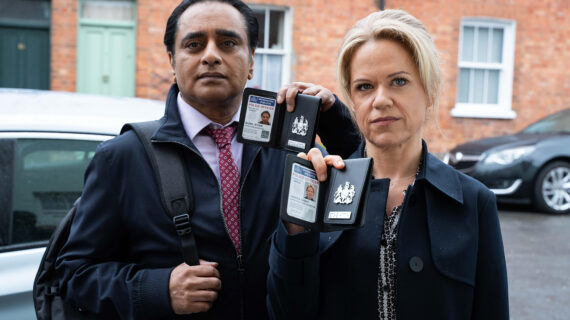Frederica Freyberg:
We move now to the ongoing coverage of Affordable Care Act. Remember the flap over the cancelled insurance policies and President Barack Obama’s fix allowing insurance companies to maintain current plans? Our own US senator, Ron Johnson, introduced legislation called, If You Like Your Insurance Plan You Can Keep It Act. But in all of that, it turns out this isn’t an issue in Wisconsin. That has everything to do with the state insurance commissioner's office. Dan Schwartzer is deputy insurance commissioner, and is here to explain. Thanks for being here.
Dan Schwartzer:
Thanks, It's great to be here.
Frederica Freyberg:
Well, so as we've said, lots of talk about all of this, and the fixes and the legislation being introduced, and all of that. But why doesn’t Wisconsin have an issue with canceled policies?
Dan Schwartzer:
Early on we looked at the ability for early renewals and there was really nothing the federal law or our state law to prohibit insurers from doing early renewals. There was certainly allowed within the confines of the federal law. And so early on we made a decision and informed the market that we would not only allow those early renewals to occur, but we would encourage it. It allows people to keep their plans going into ’14 if, in fact, they like their plans. Now there's insurers– Agents have to disclose, what other plans are available, have to talk at least a little bit about the ACA and what’s in the exchange. But by and large, once the consumer makes the decision, that gave them the ability to stay in their current plan longer.
Frederica Freyberg:
One question though would be, does encouraging insurance companies to early renew kind of fly in the face of the intent of the Affordable Care Act, which was to get people into more robust plans with those attached subsidies?
Dan Schwartzer:
I don't know if I would use the words, fly in the face. I think what it does is what we've always done in Wisconsin. We believe in having robust competition, a lot of choices, a lot of consumer choices, making sure that consumers have all of the information available to them and then letting them make their decision as to what's best for them in terms of their health insurance policies and their needs. This was, again, just something we have done from a regulatory perspective, giving those consumers the options and letting them make their decisions.
Frederica Freyberg:
Do you know how many people availed themselves of renewing early and then maintaining these same policies over the next year?
Dan Schwartzer:
So in the small group market– Almost every insurer offering coverage in the small group market made the early renewals available and most of the– From what we hear, most of small groups' clients actually took advantage of that early renewal process. In the individual market, the same. Most of the insurers in the individual market made that available to their consumers, and most consumers took advantage. So if I were to give you exact numbers it would be difficult. We won't know until after December 1st as to how many took advantage of it. But from what we hear from the insurers, a majority did.
Frederica Freyberg:
We're talking hundreds of thousands of people?
Dan Schwartzer:
Yes.
Frederica Freyberg:
Won’t these hundreds of thousands of people that we are talking about just be right back in the same spot a year from now when they're confronted with having to comply with the ten essential benefits in the Affordable Care Act? And they're holding these policies that they renewed that don’t have to comply that way.
Dan Schwartzer:
I wouldn't say a year from now. There's probably even more ability to extend it even into 2015, their plans. And so as we get into next year, as we get closer to October of next year, there's likely to be more early renewals, which would allow them to renew into 2015. But even then, if it ends in 2015, yeah, at that point they're going to have to makes decisions. But it’s all about giving consumers the options and the choices. Giving them the ability to make informed decisions.
Frederica Freyberg:
So people can keep renewing and going along this way, and avoiding the whole marketplace?
Dan Schwartzer:
Probably not endlessly, but the letter we received and discussion from the president last week really wasn’t a regulation and it really wasn't a statute. It was a discussion, an idea, that they put on paper to give commissioners the ability to look at opportunities in their states for doing early renewals. We already took advantage of those early renewals, as we talked about. But at this point, from the commissioner’s perspective, we are– again, looking to give consumers as much choice as we can give them.
Frederica Freyberg:
My recollection was that the Obama administration guidance said that they could do it for a year. But somehow our state can do it for longer?
Dan Schwartzer:
No, the guidance talked about– It wasn’t guidance. And again, this gets a little in the weeds. What it was was an opinion or a suggestion from the administration. As a state regulator, we looked at what was given to us and we go back to enforcing our state authority in terms of how we're going to regulate our market. Where we are looking at potentially going into'15 is, in that letter it talked about plans that renew between January and October of 2014 can renew again. That allows you to get into 2015.
Frederica Freyberg:
Even though they would have renewed 2013 as part of the early renewal.
Dan Schwartzer:
Correct.
Frederica Freyberg:
All right. So the other thing that Governor Walker is seeking from the Obama administration is to allow subsidies on all plans even those outside the exchanges.
Dan Schwartzer:
Correct.
Frederica Freyberg:
Why does he want that?
Dan Schwartzer:
If you look at where all of the bottleneck is occurring, it’s occurring at the federal website. People have been unable to get in. It's not that some haven’t gotten in. Because, as we know, 877 were able to get in, and some even secured some subsidies. But you can’t say that it’s working smoothly and that everyone has had the ability to get on the website. That’s one of the reasons the governor wanted to extend both the HIRSP population and Medicaid population for an additional 90 days to give them an additional 90 days to get that coverage. But as a suggestion, one of the thing that would free up that bottleneck would be to allow the subsidies to go to any plan that's purchased by an insurer, whether they buy that plan on the exchange or whether they buy it one the outside market. If you look a map of Wisconsin and you look at all of the carriers that decide to display their rates on the exchange versus those that decided not to display their rates on the exchange, it’s a stark contrast. You know, county by county you'll see six carrier offering coverage on the outside market and only one displaying their rates on the exchange. Why wouldn’t you allow, in Wisconsin, all of the choice and competition that's out there? Why wouldn’t you allow those subsidies to flow to those other carriers? And remember that the carriers that are on the outside market have to have the exact same benefits and the same rate structure as those that are displaying their rates on the exchange. Why wouldn’t you allow that– Avoid that bottleneck, allow that consumer choice and competition to occur, and let that subsidy go to that any insurer that they're buying from.
Frederica Freyberg:
What is the word from the Obama administration on the request?
Dan Schwartzer:
We have not heard. The first that we've heard any response to the letter I was on a round table this week where Kathleen Falk was on the round table as well, via video conference. And she acknowledged that she had received– that they had received the letter and that they are looking into it. So we're hopeful that they are taking our suggestion and allow Wisconsin consumers– You know, that additional choice and competition.
Frederica Freyberg:
All right. Dan Schwartzer, thanks very much for joining us.
Dan Schwartzer:
Thank you.
Search Episodes
Related Stories from PBS Wisconsin's Blog

Donate to sign up. Activate and sign in to Passport. It's that easy to help PBS Wisconsin serve your community through media that educates, inspires, and entertains.
Make your membership gift today
Only for new users: Activate Passport using your code or email address
Already a member?
Look up my account
Need some help? Go to FAQ or visit PBS Passport Help
Need help accessing PBS Wisconsin anywhere?

Online Access | Platform & Device Access | Cable or Satellite Access | Over-The-Air Access
Visit Access Guide
Need help accessing PBS Wisconsin anywhere?

Visit Our
Live TV Access Guide
Online AccessPlatform & Device Access
Cable or Satellite Access
Over-The-Air Access
Visit Access Guide
 Passport
Passport


















Follow Us